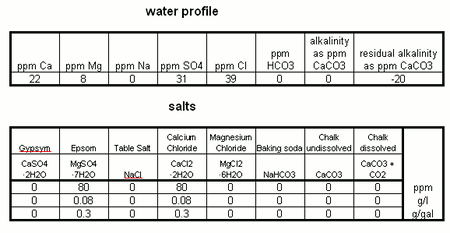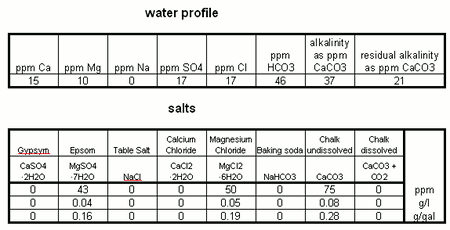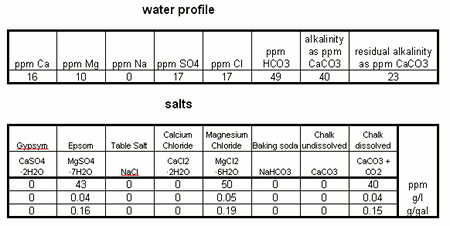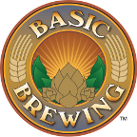Difference between revisions of "Various water recipes"
(→Brewing school Weihenstephan water) |
(→Brewing school Weihenstephan water) |
||
| Line 46: | Line 46: | ||
works well for: | works well for: | ||
| − | * Munich Helles | + | * Munich Helles (with the use of 2-3% acid malt in the grist) |
* Weissbier (light and amber varieties) | * Weissbier (light and amber varieties) | ||
Revision as of 15:54, 25 November 2009
|
These water recipes are guidelines that brewers, who build their own water, can follow. None of these recipes have been optimized for a given style but the residual alkalinity is chosen such that it should yield a satisfactory mash pH when used for the listed styles. Since the acidity of the grist can vary significantly even for a given style additional adjustments might be necessary. All water recipes include a copy of my water calculation spreadsheet which can be used to make such adjustments. In that spreadsheet you may also enter a starting water profile if that is known. Some of the recipes used magnesium chloride. I got this salt from a fellow brewer who also keeps fish and used it to build water for the aquarium. If you don't have access to MgCl2, don't worry and just omit it or make up for it with some more Epsom salt. very soft waterThis is a very soft water option for a Munich Helles or a Pilsner. I have used this for one batch and despite the low calcium level did not have problems with the getting the beer to clear. Paulaner, for example, uses a deep well from which they get very soft (~ 2 dH / 30 ppm CaCO3 Hardness) brewing water. I don't know if they are adding additional minerals when they brew their lighter beers with that water but it is very likely that they don't. I use this water with a 97% Pilsner malt and 3% acidulated malt (Sauermalz) grist and get a mash pH of about 5.3-5.4. works for:
|
Brewing school Weihenstephan water
It is not often that I come across actual brewing water analysis data in the literature but the Markus Hermann's dissertation gave an insight into the water that is used for brewing studies at the Weihenstephan brewing school in Freising, Germany.
While it makes a great Water for Weissbier, it is not necessarily the water that the Weihenstephan brewery uses.
with unsdissolved chalk:
with chalk dissolved with CO2:
water_weihenstephan_dissolved_chalk.xls
works well for:
- Munich Helles (with the use of 2-3% acid malt in the grist)
- Weissbier (light and amber varieties)




